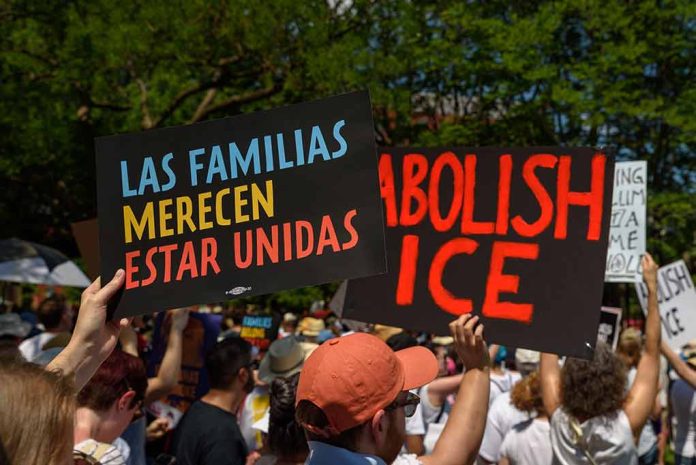
President Trump has unveiled a bold plan to address illegal immigration by offering money and airline tickets to undocumented immigrants who voluntarily leave the U.S., with potential pathways to return legally.
Key Takeaways
- Trump’s self-deportation program would provide financial stipends and airfare to illegal immigrants who voluntarily leave the U.S.
- The plan prioritizes deporting criminal migrants while creating pathways for “good” migrants to return legally.
- Industries like agriculture and hospitality could benefit from the program through a worker recommendation system.
- Nearly one million migrants have already received formal termination notices with warnings to self-deport immediately.
- Those failing to comply with self-deportation notices could face permanent reentry bans.
Financial Incentives for Voluntary Departure
President Trump has outlined a new approach to handling illegal immigration by proposing financial incentives for undocumented immigrants to leave the United States voluntarily. The plan, detailed in recent interviews, would provide migrants with monetary stipends and paid airfare to return to their home countries. This initiative represents a significant shift in immigration enforcement strategy, moving away from mass deportation operations toward a system that encourages self-deportation while maintaining the option of legal return for qualifying individuals.
The Department of Homeland Security has already updated the CBP One app to facilitate this process, allowing migrants to announce their intent to self-deport. According to Trump, those using official channels like the CBP app would have better chances of being approved for legal return. This technological implementation suggests the administration is preparing the infrastructure needed to execute the program on a large scale, though specific timelines for full implementation remain unclear.
U.S. President Donald Trump said in an interview aired on Tuesday that he planned to roll out a new program offering money for immigrants in the country illegally to leave voluntarily. https://t.co/6C50LBCSLi pic.twitter.com/WpWviPT5pb
— Reuters (@Reuters) April 16, 2025
Prioritizing Criminal Deportations
The Trump administration has made it clear that deporting migrants with criminal backgrounds is their top priority, rather than those whose only offense was crossing the border illegally. This selective enforcement approach aims to address public safety concerns while preserving workforce availability in critical sectors of the American economy. Nearly one million migrants have already received formal termination notices warning of immediate self-deportation requirements, with serious consequences for non-compliance including potential permanent bans from entering the United States in the future.
“We’re going to give them a stipend. We’re going to give them some money and a plane ticket, and then we’re going to work with them – if they’re good – if we want them back in, we’re going to work with them to get them back in as quickly as we can,” explained Trump.
The administration faces criticism over recent deportations to El Salvador, where some migrants have reportedly been sent to prisons. These incidents have raised concerns about how the self-deportation program would ensure safe returns and whether the promised legal pathways back to the United States would materialize. Critics question the fairness of requiring people to leave before they can apply for legal status, especially for those who have established lives and families in America.
Economic Considerations and Labor Needs
Trump has emphasized the importance of maintaining a steady workforce for American businesses, particularly in agriculture and hospitality sectors that have traditionally relied on immigrant labor. The self-deportation program includes provisions to recommend workers for these industries, suggesting a pragmatic recognition of economic realities despite the tough stance on illegal immigration. This balancing act reflects the complex relationship between immigration enforcement and American economic interests.
The proposed program represents an attempt to address the border crisis through incentives rather than solely through enforcement actions. By offering financial assistance for voluntary departure, Trump aims to reduce the undocumented population while creating a more orderly process for those seeking to work legally in the United States. However, many questions remain about implementation details, funding sources for the stipends, and the criteria that would determine which migrants qualify as “good” candidates for legal return.
Sources:
Trump offers illegal migrants money and airplane ticket to self-deport to fix border crisis



